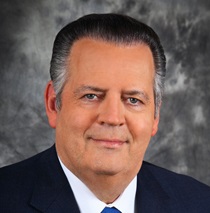By Bob Allen
Both the current and past presidents of the Southern Baptist Convention Ethics and Religious Liberty Commission have criticized President Obama’s recently announced plan to restore diplomatic relations with Cuba.
 Richard Land, president of Southern Evangelical Seminary who retired after 25 years as Southern Baptist’s top spokesman for public policy concerns in 2013, said in a press release that “appeasing dictators and compromising with evil” is not the way to help Cubans. He urged members of the Senate not to lift an economic embargo put in place after Fidel Castro seized control of Cuba in 1959.
Richard Land, president of Southern Evangelical Seminary who retired after 25 years as Southern Baptist’s top spokesman for public policy concerns in 2013, said in a press release that “appeasing dictators and compromising with evil” is not the way to help Cubans. He urged members of the Senate not to lift an economic embargo put in place after Fidel Castro seized control of Cuba in 1959.
“Cuba is in terrible, desperate shape, and our president is simply throwing the country a life-preserver because of the terrible economic conditions,” Land said. “The reality is that once we know the truth, the truth shall set us free. And the truth is that appeasing dictators and compromising with evil does not work.”
“Reestablishing ties will only prolong the agony of the Cuban people,” Land said. “As Americans, we must do what we can to help lift the yoke of oppression from the Cuban people, but that will not be accomplished by throwing a lifeline to the totalitarian, rights-abusing government of Castro’s Cuba.”
Russell Moore, a former seminary professor and administrator who took the helm of the ERLC in June 2013, said on Twitter that he agrees with Sen. Marco Rubio (R-Fla.), a Cuban-American and chief opponent of the president’s plans to normalize relations with Havana.
Moore said the U.S. should have used leverage to get human-rights concessions and contended that the embargo has worked for its intended purpose “to isolate Cuba and keep it a client state.” He encouraged prayer “for a free Cuba, with full religious liberty and other human rights.”
Much is made about Land’s and Moore’s contrasting style. Land’s outspokenness made him a lightning rod for controversy and established his reputation as a mover and shaker in the Religious Right. Moore, on the other hand, has tried to keep a safe distance from partisan politics and in some circles is labeled a “social liberal.”
Their agreement about Cuba, however, puts them at odds with more moderate Baptist leaders who issued statements praising Obama’s new Cuba policy.
Neville Callam, general secretary of the Baptist World Alliance, “enthusiastically” welcomed the decision to begin to normalize U.S./Cuba relations. “The people of Cuba, including the large Christian community there, stand to benefit from this development that represents a contribution to human flourishing,” Callam said.
Roy Medley, general secretary of American Baptist Churches USA, said the U.S. decision will ease the suffering of Cubans.
“American Baptist Churches USA has long advocated for the normalization of relationships between our two countries, believing that the economic sanctions were creating undue hardship upon the poor while contributing nothing to our national security,” Medley said. “We welcome the increased opportunities this will permit for relationships with the Baptists of Cuba.”
Ray Johnson, coordinator of Florida CBF, rejoiced “with every Cuban, both here and in Cuba, who will see a new day as diplomatic relations are normalized, as families are reunited, as both of our cultures begin to embrace one another as neighbors and friends.”
Rubio, viewed as a likely presidential candidate in 2016, has said he would be in favor of relations with Cuba if the country would reciprocate with concessions including steps towards democratization and ending human rights abuses.
Lacking that, Rubio, whose parents fled Cuba, said offering an olive branch to “the most repressive regime in the hemisphere” only rewards bad behavior.”
Land said rights enumerated in the Declaration of Independence are not reserved only for Americans.
“These are universal values,” he said. “They come from Scripture. Our forefathers knew how to tie our faith and our beliefs to our everyday worldview — in how we deal with others, how we live our lives and how we run our governments.”
“Cubans should be able to worship as they please, share the gospel and evangelize. but they are without protections of the God-given freedoms outlined in our First Amendment,” Land said “Why should the United States extend anything extra to Cuba when it takes away so much from its own people?”
Previous story:
